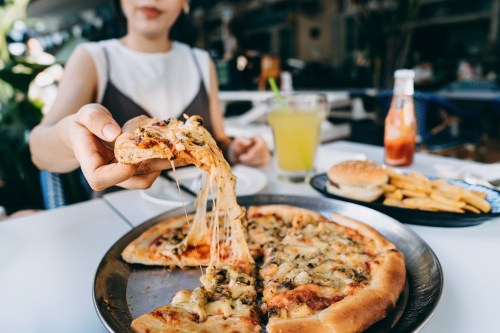Eat whatever you want, whenever you want—and improve your cholesterol and blood sugar levels while feeling happier and more confident about your body. Sold?
That’s the promise behind “intuitive eating,” a term coined by dietian Evelyn Tribole and Elyse Resch in their 1995 book, Intuitive Eating: A Revolutionary Program the Works. Although the theory is a bit more involved than that, this relatively straightforward approach to food may seem quite radical to many of us used to complicated diets with lots of rules about what you can and can’t eat (ahem, keto).
While the concept has been growing more popular in recent years, (and has long been a mainstay of eating disorder recovery), intuitive eating started to attract more widespread attention after author Jessica Knoll credited it to changing her relationship with food after years of dieting in a June essay for the New York Times. But the philosophy is certainly older than this year. “Intuitive eating is reconnecting with a way of eating that always existed,” says Alissa Rumsey, MS, RD, a certified intuitive eating counselor and owner of Alissa Rumsey Nutrition and Wellness.
What is intuitive eating?
Most eating plans tend to have pretty particular rules, whether it’s sticking to a very specific amount of calories or macronutrients per day (like the ketogenic diet), completely avoiding entire food groups (like the Paleo diet), or eating only on certain days of the week or at certain times of the day (like various forms of intermittent fasting). Most of these plans promote weight loss as one of their main benefits (although that’s not necessarily the driving motivation for every person who adheres to these plans).
Intuitive eating, on the other hand, is a non-diet approach to health and wellness that involves nourishing yourself by tuning into what your body tells you what you want and need to eat. Instead of trying to follow a strict eating plan, the goal is to be in touch with what your body is signaling physically, mentally, and emotionally in any given moment, and make food choices accordingly. Basically, if you feel hungry, you’re encouraged to check in with that feeling and then eat.
For more low-down on intuitive eating, check out this FAQ from a top dietitian:
The goal of intuitive eating has nothing to do with weight management. Instead, intuitive eating is designed to help people get out of the diet cycle and heal their relationship with food, so they’re in a place where food no longer controls their thoughts, says Rumsey. That process is different for everyone, and our relationships with food and our bodies change throughout our lives. “It’s a dynamic process of learning about your body and responding with compassion and respect,” she says.
Why is intuitive eating so popular right now?
Remember how we mentioned all of those more restrictive eating plans earlier? While they remain very popular, not everyone is as enthused by their dominance in the healthy eating world.
“People are sick of diet culture and the pressures placed upon them by external cues to eat in a way that may not align with what they truly need,” says New York-based nutritionist and health coach Jessica Cording, RD.Diet culture, in case you’re unfamiliar, is a system of beliefs that equates thinness with health and morality, and demonizes certain foods while championing others. Many experts feel that restrictive diets, no matter how cloaked in wellness speak they are, still promote the ethos of diet culture.
It’s not just a matter of semantics; Rumsey blames diets and excessive exercise for robbing us of the pleasure of food. Some studies, she notes, have found that over-focusing on nutrition labels increases the rate of binge eating as well as other eating disorders like anorexia and bulimia. Other research has found that diets just aren’t all that effective in the long term: most people on a diet regain weight they lost within two to five years.
“I think as a culture we have hit diet rock-bottom and are finally coming to understand how the very things we were doing to help our bodies were actually hurting.” —Alissa Rumsey, MS, RD
Since intuitive eating is about changing your whole outlook and behaviors around food without the unsustainable restraints of a restrictive diet, practitioners say it can help you to learn to eat healthier for the long run. That comes with lots of benefits. Studies suggest that intuitive eating may help improve cholesterol levels and lower triglyceride levels, boost self-esteem and body image, increase optimism and satisfaction with life, and promote proactive coping skills.
“My clients who adopt intuitive eating practices love the mental and emotional freedom of not feeling consumed by constant thoughts about food. It helps dial down the drama around food and exercise and allows them to feel calm and confident about their ability to take care of themselves,” says Cording.
“Research shows that positive health outcomes are related to behavior change, not to weight change. People at higher weights who change their behaviors see the same positive health outcomes even when their weight remains the same,” says Rumsey. “I think as a culture we have hit diet rock-bottom and are finally coming to understand how the very things we were doing to help our bodies were actually hurting.”
How does intuitive eating work?
The concept is simple—eat what you want, when you want it—but intuitive eating is guided by a series of 10 main foundational principles. The sequence of these principles is well thought out, with each step leading to the next, says Rumsey. That means it’s essential to master each principle in order, one by one:
1. Reject a diet mentality
It’s only possible to eat mindfully once you break down ingrained misconceptions and constraints around food, which is why the first step of intuitive eating is to reject the promises and claims of diets, says Rumsey. She recommends unfollowing and unsubscribing from social media accounts and mailing lists that focus on dieting to help you with this effort.
2. Eat when you’re hungry
“The body is inherently a really strong communicator about the foods we need,” says Cording. “People have a hard time trusting those signals due to anxiety or fear.”
Not sure you’re in tune with your body’s signals? Cording suggests rating your hunger on a one-to-10 scale every time you’re about to eat. Doing so will help you get used to checking into your body’s cues.
3. Make peace with food
Diets come down to rules about what you can and can’t eat—and that’s often shrouded in very loaded language. But people tend to struggle most with intuitive eating when they’re caught up in a diet mentality of ‘good’ and ‘bad’ foods, notes Rumsey. “Focus on all the foods that you enjoy and make you feel good,” she says.
4. Challenge feelings of guilt around food
Most of us have a complex relationship with food, given how it affects our health and waistline. It’s no wonder we often have an emotional relationship with food, tied up in feelings of perfectionism, guilt, shame, or desperation.
The key to success with intuitive eating is to reframe your food choices from restrictions to choices, remaining as open-minded, nonjudgmental, and flexible as possible. “It’s about self-care rather than self-control,” says Rumsey.
5. Respect feelings of fullness
Many of us have a hard time tuning into our body’s signals because of our past experiences—whether it’s due to trying (and failing) at previous diets, societal pressure to eat less to look a certain way, or damaging attitudes about food in our families. Try to step away from those emotions and tune into your body’s feelings of fullness when you eat. “Putting down utensils between bites also helps to give the brain and body a chance to sync up,” says Cording.
6. Eat to feel satisfied
Instead of thinking of foods as restriction, think of it as enjoyment. “It involves eating both healthy, nourishing foods and more indulgent foods, and choosing your moments based on what you truly feel you want and need,” says Cording.
That does technically give you a free pass to eat whatever you want whenever you want. Rumsey explains our diet culture has conditioned us to think that translates to a sugary free-for-all—but it doesn’t have to. “Listen to your brain and make a decision on what to eat that is based on self-care, and one that honors your health and your body’s needs,” says Rumsey. Sometimes that might be mac and cheese, and sometimes that might be a kale and quinoa salad bowl. Both are perfectly valid choices.
7. Find alternatives to address emotions other than eating
We all eat emotionally sometimes—we’re human! That’s why in intuitive eating, using food as a coping mechanism isn’t in and of itself bad. “I only worry when food is the only coping mechanism,” says Rumsey.
Not sure if you tend to eat for emotional reasons? Rumsey and Cording suggest jotting down your feelings in a journal each time you eat in order to get back in touch with your body’s hunger, fullness, and satisfaction cues. (Just skip the food tracking, which can quickly turn into micromanaging calories and nutrients.)
If you notice that a certain emotion triggers you to eat, the goal isn’t to restrict yourself when you feel that emotion surfacing. Instead, find other outlets for stress, anxiety, sadness, or any other emotion that leads you to eat—like taking a walk, writing, calling a friend, reading, or deep breathing. A mental health professional and/or a registered dietitian can help you to navigate this process.
8. Accept your body shape
The goal of intuitive eating isn’t weight loss, and it isn’t about changing your body shape or type. “If you don’t fully let go of diet culture or the intention to lose weight, you’ll likely struggle to find the true peace that comes with intuitive eating,” says Rumsey. “Try to show yourself compassion.”
9. Exercise to feel good
Many people use exercise and diets interchangeably as a way to control our bodies—which is why “intuitive movement,” as it’s known, is one of the 10 golden rules of intuitive eating. “It means asking yourself, ‘What does my body need today?’ Or, ‘what type of movement do I feel like doing? What type of exercise would be most beneficial to my body today?’” says Rumsey.
10. Eat to honor your health, with “gentle nutrition” choices
Intuitive eating isn’t a diet, and it doesn’t involve eating “clean” or avoiding sweets. Instead, it’s about “gentle nutrition”—combining the signals from your body with knowledge about nutrition to make food decisions from a place of self-care rather than self-control. “The key is that you are making the choices from a place of honoring your health, not from any lingering diet culture motivations,” says Rumsey. Having an open mind allows you to explore what foods feel best for you personally.
“Some people find [intuitive eating] more difficult than others, but I truly believe that these principles can be beneficial for anyone.” —Jessica Cording, RD
So can most people really get to a place where they naturally crave nutritionist-approved fresh and unprocessed foods? Intuitive eating fans say yes. “I find that most people who have made peace with food and are honoring their hunger are naturally start to gravitate towards more fruits and vegetables,” says Rumsey.
For some of us, the choice to eat healthy foods like vegetables may not necessarily come from cravings but ultimately a conscious decision to put self-care first. “This is where gentle nutrition comes in,” Rumsey says. In other words, we gently nudge ourselves to explore ways to enjoy more of the foods we know do our body good. She points to one client who, after experimenting with ways of cooking new and different types of veggies, found many options that she genuinely enjoyed and that made her body feel good.
Who can benefit from intuitive eating?
Experts say that everyone can practice intuitive eating—even people with particular health conditions or food sensitivities.“Some people find it more difficult than others, but I truly believe that these principles can be beneficial for anyone,” says Cording.
The main risk of intuitive eating is falling back into a diet mentality and using intuitive eating principles to apply a new set of strict rules to your mealtime habits. “Focusing too much on the principles of honoring your hunger and respecting your fullness can lead to the same emotional cycle as dieting: Guilt when you eat past fullness or overthinking your hunger cues,” warns Rumsey.
We likely won’t see the end of restrictive eating plans for a while yet. But as more and more people become interested in less restricted, more loving ways to eat and live, you can expect to see continued interest in the principles of intuitive eating—balance, self care, and loving yourself and your body. There’s nothing more wellness-y than that.
Here’s why it’s extremely okay to say yes to your cravings for unhealthy foods. And yeah, can we stop with the whole “Freshman 15” thing?
Sign Up for Our Daily Newsletter
Get all the latest in wellness, trends, food, fitness, beauty, and more delivered right to your inbox.
Got it, you've been added to our email list.










